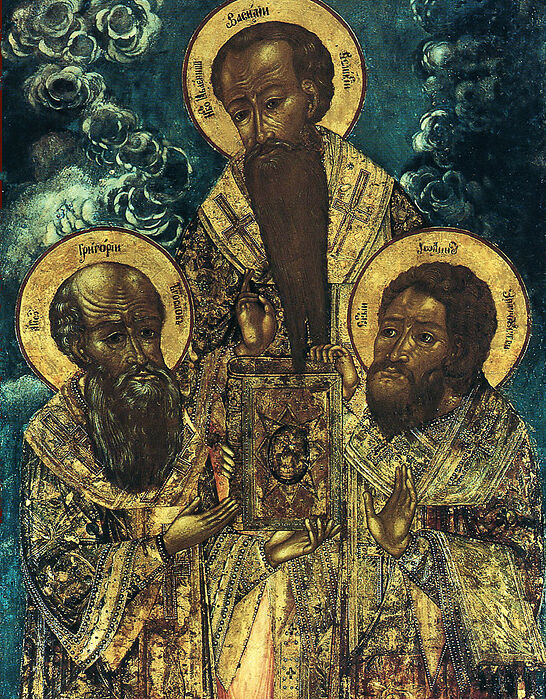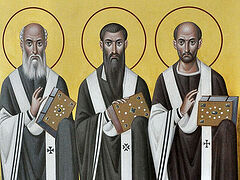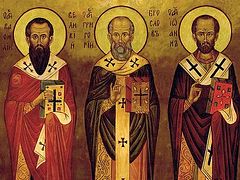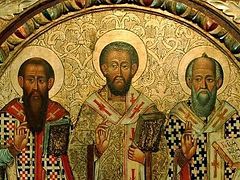In the name of the Father, and of the Son, and of the Holy Spirit.
Dear brothers and sisters! Today is a holy feast. The Church now glorifies those great laborers in the field of the Church who are called Ecumenical Teachers and Holy Hierarchs. It emphasizes that although every one of them was at one time a diocesan bishop, their spiritual influence has spread far beyond the bounds of their dioceses. The flock of the entire Ecumenical Orthodox Church learns Christian wisdom, knowledge, and piety from them. The Church has already glorified them individually. At the very beginning of January, we glorified St. Basil the Great, then St. Gregory the Theologian, and just a few days ago was the translation of the relics of St. John Chrysostom.
But now is established the special feast of the Three Holy Hierarchs. After they finished their earthly journeys, each of them had their devoted venerators, even whole groups of them, named Basilians, Gregorians, and Johannites. They disputed about which of the Holy Hierarchs stood higher before God. And then, all three of them appeared in a dream to a certain bishop and said that for the sake of unity and the love of all, the Lord blessed to establish a common feast in addition to their individual commemorations.
St. Basil the Great—the luminary of the Church, a hierarch—is named first, as if the primate of the entire host of Holy Hierarchs. We know about his courage, his steadfastness, about how he alone repelled the onslaught of enemies—the Arian heretics. The enemies themselves said of him that the Church listens to just St. Basil more than to all of them. The Arians told the king: “If we don’t destroy him, don’t remove him, then our labors are in vain. He’s not a man, but a rock—it’s impossible to defeat him.”
St. Basil the Great adorned the Church with his innumerable labors, his pious life, and left behind a rich inheritance: First of all, his Divinely inspired Liturgy, which is celebrated ten times a year. He was characterized by depth of mind and thought. If St. Basil the Great elucidated any issue, then there was nothing more to add. And how many prayers belong to St. Basil the Great! Let us recall the kneeling prayers of Pentecost. And there’s the Prayer of the Hours: “Thou Who at all times and at every hour, in Heaven and on earth, art worshiped and glorified, O Christ God”—a prayer of amazing depth and power! The prayers at the end of the Hours also belong to St. Basil the Great.
His great friend St. Gregory the Theologian was a man of the same genius and colossal gifts. He lived in perfect harmony with St. Basil all his life, with the exception of a short period when St. Basil compelled him to accept the episcopal dignity. St. Gregory’s humble soul grieved over it and conveyed this grief to his friend.
St. Gregory didn’t compose a Liturgy, but he also adorned the Church with his works. Who doesn’t know the Nativity Canon, the Paschal Canon? One begins with the words, “Christ is born,” and the other: “It is the day of Resurrection! Let us be radiant, O people!” The holy hymnographers, the authors of the canons took these words from the God-inspired homilies of St. Gregory the Theologian.
When we read his works, it’s impossible not to admire his thought. His deep, holy, inspired thought reminds us of a sharp and polished sword in the hands of the skilled master who possesses it. This is especially evident in his works where he denounces heresy. When he theologizes, his mind—purified, enlightened, deep—rises to that exceptional height at which the Church glorifies him, saying: “Rejoice, O father, thou uttermost mind of theology”—that is, a mind that has risen to the highest degree, to the highest bar, to which only the human mind can rise.
He and his friend St. Basil were people of completely different temperaments. St. Basil was a natural leader, and St. Gregory was a “desert turtledove,” as is said about him, constantly seeking solitude. They also died in completely different ways. St. Basil—among the weeping people; St. Gregory—in complete solitude, alone with God.
Dear brothers and sisters, and how steadfast they were when the truth of the Church needed defending! Let us recall from his life how St. Basil responded to the threats of the imperial official who tried to induce him towards the Arian heresy. Seeing that he was dealing with a rock rather than a man, the eparch started threatening St. Basil with the confiscation of his property, with exile, torture, and death. But St. Basil replied: “You can’t frighten us by taking away our property—I don’t have any, save for a few liturgical books. You threaten with banishment, but the earth is the Lord’s, and the fullness thereof (Ps. 23:1). The whole earth belongs to God and I’m at home everywhere. My weakened body won’t endure tortures—I’ll only feel one blow anyway. But death will be a blessing for me, for I will depart to God, for Whom I have been striving all my life.” Reporting about the steadfastness of St. Basil, the eparch said: “Emperor, we stand defeated by a leader of the Church. This man is above threats, firmer than any argument, stronger than any persuasion.”
Likewise, when St. Gregory was threatened with expulsion from Constantinople, he replied: “If they could drive me out of the Heavenly Kingdom, from the Heavenly Jerusalem, that I would fear. But all these other threats are empty delusions for me, as though they were blowing wind and splashing water.”
And the third Holy Hierarch, St. John Chrysostom, is a great preacher and orator. There has never been and never will be a preacher equal to St. John. It’s not in vain that the Church has preserved the name of Chrysostom, which one faithful woman who was listening to his preaching among the people once attributed to him in delight. When the Holy Hierarch would preach, the spirited Greeks would break out in applause, unable to bear the amazing beauty and power of his words.
And what riches he left us: the body of his homilies, his beautiful God-inspired works, his interpretations of Sacred Scripture, and also his Liturgy and numerous prayers that we still read now. And when the hour of his repose arrived, how great he proved to be in spirit! They mercilessly dragged him into exile, cruelly tortured him along the way, and when he could no longer walk, the holy Martyr Basilisk, who had suffered at that place, appeared to him and encouraged him with fraternal love, saying: “Brother John, take courage. Tomorrow we shall be together.” And when he died, his last words were: “Glory to God for all things.”
And so, dear brothers and sisters, the holy Church celebrates the memory of such Holy Hierarchs today! What strength of spirit! What an example for us infirm sinners! Let us resort to them more often in our prayers. Let us stand firmly in the Orthodox faith, offering repentance for our sins. Only repentance, the correction of our sinful life, can help us, through the intercessions of the Holy Hierarchs celebrated today, to achieve eternal blessedness.
Amen.





